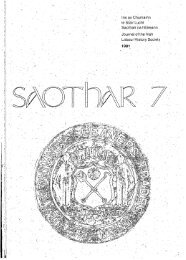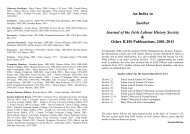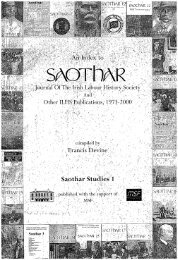74 SAOTHAR 13traditional in many of Ulster' s rural counties. While before 1830 religious riots in the town were stillrare, in the succeeding decades clashes became more frequent. 61 But sectarian animosities, importantthough they were in shaping Belfast's development, and in creating a strong sense of religious identityin both Protestant and Catholic communities, were not the only outlet for religious energy. This aspecttends to overshadow the rich diversity of religious! experience, both formal and informal, which wasan integral aspect of everyday society.The records of the Belfast Town Mission - 'a moral engine for the benefit of the poor, the untaughtand neglected population of our town' - offer valuable insights into popular urban religious attitudesin the fIrst half of the nineteenth century.62 Despite the strenuous efforts of local clergy, limited byinadequate funds in their attempts to increase church provision, church attendance does not seem tohave been a major priority of the lower classes. 63 There may well have been practical reasons for this.Pride and tradition required potential churchgoers to invest in at least a decent suit of clothes, and itseems that many of those who neglected public worship did so partly because poverty rendered themunable to meet the social demands of the occasion. 64 It seems likely that those who did atttend thechurches were already endeavouring to lift themselves to a stable social level, and availing themselvesof every opportunity to do so. This suggestion is supported by clerical comments on the social and moralimprovement consequent upon regular church attendance. 65 For a majority of sluni dwellers, however,social distinctions, seating patterns and the cultural assumptions of those in control of the content ofpublic worship reinforced a sense of alienation.It was these 'outcasts' whom the Belfast Town Mission endeavoured to reach. The society operateda system of domestic visitation which was strictly religious in purpose. Agents were instructed to visit,converse on religious matters, to read tracts or scripture portions and issue invitations to churches orSunday schools. Although their efforts often met with opposition or hostility, they were frequentlymade welcome, and their conversations with the 'rough' working class often revealed a variety ofreligious experience, no less potent because of its informal nature. 66 Many people who had been in thehabit of attending religious venues in their youth now, either because of migration, lack of facilities,or simply as a natural result of the ageing process, neglected even the most basic' religious duties.Nonetheless, it was evident that religion could retain its emotional hold while losing its institutionalframework, with Bible reading and religious conversations offering nostalgia, diversion and comfortin the midst of bleak poverty. The mission agents had some success in persuading backsliders to attendthe local 'stations' which organised religious services outside the rigid social pressures of the church.However, many of those who retained a grasp of what they considered the 'essentials' of religion,displayed no interest whatsoever in.doctrinal orthodoxy. Their vague belief ihat a generally wellintentioned life, lived free of the worst debaucheries, would be rewarded, was more prevalent than openscepticism or unbelief - and more difficult for the churches to counteract. 67 And while clergy perceivedtheir role to be that of organisers of social and cultural cohesion, religion - particularly of the aggressive,evangelical variety - could also be a di visi ve force, both in the family and the community. Rifts betweenparents and children, husbands and wives, over the expression of their belief were common, and piousattitudes undoubtedly alienated a significant section of the working class community. 68 In wider socialterms, the emotive rhetoric of popular open air preachers could play on tradi tional sectarian fears. Thiswas particularly true in times of socio-economic competition and political vulnerability, when a newurgency was given to religious commitment, and a more emotional type of religious activity was bothencouraged and promoted. The border counties of Ulster in the late eighteenth century, and Belfast inthe late 1850s, were particularly susceptible, both to enthusiastic religious endeavours and to thecommunity friction which all too often followed. 69 .For many Ulster Protestants, Belfast's industrial expansion and relative prosperity was viewed asa direct consequence of its religious and ethnic base. 70 To what extent religion played a day-to-day rolein the workplace is, however, particularly difficult to determine in this period. For many employers,whatever the depth of their personal religious conviction, evangelicalism supplied an ethic, based onscriptural principles, with which to deal with the economic realities of life. The New Testament
ESSAYS 75provided the basis for social and industrial relations, with acceptance of hierarchical divisions anintegral part of the religious framework, and the interdependence of the classes similarly determined?lPaternalistic practices were thus justified, while attempts to assert class interests were seen not only associally and politically radical, but as unscriptural, and indeed, immoral.Working mens' combinations, regarded by one eighteenth century rector as 'the greatest of allpossible evils' , were, however, firmly established in Belfast by the mid-nineteenth century.72 What isless clear in this early period is the relation between religious sectarianism and the development of thetrade union movement. Paddy DevIin takes the traditional view that with many trade unions tied to theOrange Order, workers, foremen, managers andfactory owners 'rere linked in a combination againstRoman Catholicism which undermined the developmen(ofdass consciousness. 73 Others see this asan oversimplification. Henry Patterson, for example, points to a variety of tensions existing within andbetween sections of the workforce, suggesting that religious and sectarian factors would' at most, haveexacerbated these problems at particular times of heightened political tension' .74 Ronaldo Munck' scontention, thatexclusi vist practices, whether for sectarian, political or economic reasons, had the effectof segregating the workforce along religious lines, even ifthis was not always the intention, is probablya fair assessment 75In more general terms moral elevation was encouraged, both directly and indirectly, in the interestsof social stability and industrial harmony, although this can best be seen as a pervasive ideology ratherthan a systematic practice. Employers and manufacturers supported temperance, Sunday school, Townmission and revival movements, and joined with workers in a variety of paternalistic and benevolentmovements. The Belfast Working Class Association for the Promotion of General Improvement wasone such body, aiming to improve both sanitary conditions and moral welfare, to advance the characterand conditions of working men by circulating 'useful, moral and entertaining' works, and stressing thebenefits of temperance and thrift. 76 In its attention to the rights and duties between employer andemployed, it made the familiar link between personal morality and social harmony. The Protestantwork ethic was reaffirmed, with the assertion that 'idleness is the parent of crime and the forerunnerof poverty'.The clergy of Belfast, similarly concerned to encourage the interdependence of the classes, unitedwith the empoyers in these efforts. When a group of churchmen set out to develop an 'economicdoctrine of religion' to deal with the commercial realities of nineteenth century life, the scriptures onceagain provided inspiration and example. In a collection of essays entitled Gold and The Gospel. theyreminded the material beneficiaries of industry of their social duties, stressing the responsibility of manas God's steward, and urging a more systematic exercise ofbenevolence. n To what extent evangelicaltheory was put into practice by employers is almost impossible to determine, though the greatproliferation of voluntary societies concerned with social as well as spiritual problems in Belfast in thesecond half of the century suggests at least a nominal commitment to the principle of charity?8Nor is it easy to assess the extent to which paternalistic and benevolent movements influencedworking men and women. No doubt a combimltion of apathy, fatalism and faith did encourage manyof the lower classes to accept the inevitability of their place oh a rigid social scale. Community strifeand the wider political framework which intensified local disputes undoubtedly gave credence toreligious agitators and promoted religious solidarity. B ut while ethnic loyalty was no doubt important,it was never all pervasive. Competing and sometimes overlapping loyalties to denominations,employers, neighbourhoods and centres of recreation, though often neglected, were just as influentialin creating the rich texture of working class social relationships.The aim of this essay then has been to draw attention to the range of methods used by landlords,employers, clergy and voluntary associations - under the influence of evangelicalism if not activelycommitted to its theology - to remodel the society in which they lived. Through moral agents, education,temperance, self-improvement societies, tract distribution, domestic visitation and a host of otherdevices, this activist minority made a substantial contribution to the social and cultural life of Ulsterin the first half of the nineteenth century. But their relative success - not to be exaggerated - was not
- Page 1 and 2:
JOURNAL OF THE IRISH LABOUR HISTORY
- Page 3 and 4:
ContentsPageEditorial: Labour Histo
- Page 5 and 6:
EDITORIAL 3freedom to participate i
- Page 7 and 8:
CorrespondenceThe Irish Labour Part
- Page 9 and 10:
; ~ ; ,The Decline and Fall of Donn
- Page 11 and 12:
THE DECLINE AND FALL OF DONNYBROOK
- Page 13 and 14:
THE DECLINE AND FALL OF DONNYBROOK
- Page 15 and 16:
·' THE DECLINE AND FALL OF DONNYBR
- Page 17 and 18:
THE DECLINE AND FALL OF DONNYBROOK
- Page 19 and 20:
THE DECLINE AND FALL OF DONNYBROOK
- Page 21 and 22:
THE DECLINE AND FALL OF DONNYBROOK
- Page 23 and 24:
THE DECLINE AND FALL OF DONNYBROOK
- Page 25 and 26: ,'-,;-''''.A PASSAGE TO BRITAIN 23C
- Page 27 and 28: A PASSAGE TO BRITAIN 25only in the
- Page 29 and 30: A PASSAGE TO BRITAIN 27clothing._De
- Page 31 and 32: A PASSAGE TO BRITAIN 29established
- Page 33 and 34: ;:-.",.- .. .", ...... '.:. '
- Page 35 and 36: LOUIE BENNETI 33feminist movement w
- Page 37 and 38: :... ~: ."
- Page 39 and 40: -.- '.LOUlE BENNETT 37While there i
- Page 41 and 42: LOUIE ~ENNEIT 39Xl's encyclical Qua
- Page 43 and 44: LOUIE BENNEIT 41Bennett's own relat
- Page 45 and 46: LODIE BENNETT 43109; IWWU resolutio
- Page 47 and 48: Essays in ReviewCosherers, Wanderer
- Page 49 and 50: ••• .".'. >. '~"ESSA YS IN RE
- Page 51 and 52: ESSAYS IN REVIEW 49ConnolIy:Myth an
- Page 53 and 54: ESSAYS IN ~EVIEW 51tion' in the Int
- Page 55 and 56: ESSAYS IN REVIEW53International:'I
- Page 57 and 58: REVIEWScontroversy is real history.
- Page 59 and 60: REVIEWSJoe Monks was among the earl
- Page 61 and 62: REVIEWSnolly-Column Song','Proudly
- Page 63 and 64: REVIEWSresulting from the arrival o
- Page 65 and 66: REVIEWS,63the book by means of an a
- Page 67 and 68: REVIEWSlogue, it is hardly surprisi
- Page 69 and 70: The Team For All Workers ...CULIAIB
- Page 71 and 72: ESSAYS 69mission and moral refonn.l
- Page 73 and 74: .. ...... ~.~ -~ .'- '.ESSAYS. 71fr
- Page 75: ESSAYS 73claimed authority but whic
- Page 79 and 80: ESSAYS 779. For comparisons see E.T
- Page 81 and 82: ESSAYS 7952. Annals of Christ Churc
- Page 83 and 84: ESSAYS' 81Fianna Fail and the Worki
- Page 85 and 86: ESSAYS 83Eireann in 1925 visibly di
- Page 87 and 88: ESSAYS 85recognition of the impract
- Page 89 and 90: ESSAYS 871970, it created the condi
- Page 91 and 92: ESSAYS89The Irish Immigrants' Contr
- Page 93 and 94: ESSAYS" 91Although anti -Catholic p
- Page 95 and 96: ESSAYS 93McCowie played a key role
- Page 97 and 98: :. -,,'.' ',. .~.,:.ESSAYS 95Althou
- Page 99 and 100: ESSAYS 97young girl of their own ba
- Page 101 and 102: SourcesIrish Labour History Society
- Page 103 and 104: SOURCES 101INovember, 1971 to no. 1
- Page 105 and 106: SOURCES 103would claim credit for t
- Page 107 and 108: SOURCES105Sources for Irish Labour
- Page 109 and 110: SOURCES 107NorthWest Archives and L
- Page 111 and 112: SOURCES 109In 1966 the Finnish gove
- Page 113 and 114: TURNINGANEWLEAFThe CPSSUis the larg
- Page 115 and 116: REMINISCENCE 113us due to my politi
- Page 117 and 118: REMINISCENCE 115when Jim was presen
- Page 119 and 120: REMINISCENCE 117of Dail Eireann. 17
- Page 121 and 122: REMINISCENCE 119NotesThe above arti
- Page 123 and 124: DOCUMENT STUDY 121James Connolly in
- Page 125 and 126: DOCUMENT STUDY123SOCIAL DEMOCRATIC
- Page 127 and 128:
DOCUMENT STUDY 125proletariat of th
- Page 129 and 130:
DOCUMENT STUDY 127the support of Je
- Page 131 and 132:
DOCUMENT STUDY 12926. The Workers'
- Page 133 and 134:
131BibliographyA Bibliography of Ir
- Page 135 and 136:
BIBLIOGRAPHY 133Compton, P.A. Demog
- Page 137 and 138:
BIBLIOGRAPHY 135Levine, I. and Madd
- Page 139 and 140:
BIBLIOGRAPHY 137Turner, M. 'Towards
- Page 141 and 142:
BIBLIOGRAPHY 1394. Land and Agricul
- Page 143 and 144:
BIBLIOGRAPHY 141Clogher Record12 (2
- Page 145 and 146:
BIBLIOGRAPHY 143Political Research
- Page 147 and 148:
BIBLIOGRAPHY 145Pres, 1987.O'Brien,
- Page 149 and 150:
147Notes on Contributorsf onathanBe
- Page 151 and 152:
1901: Ireland's first general union
- Page 153 and 154:
ELECTRICAL TRADES UNION .Establishe





